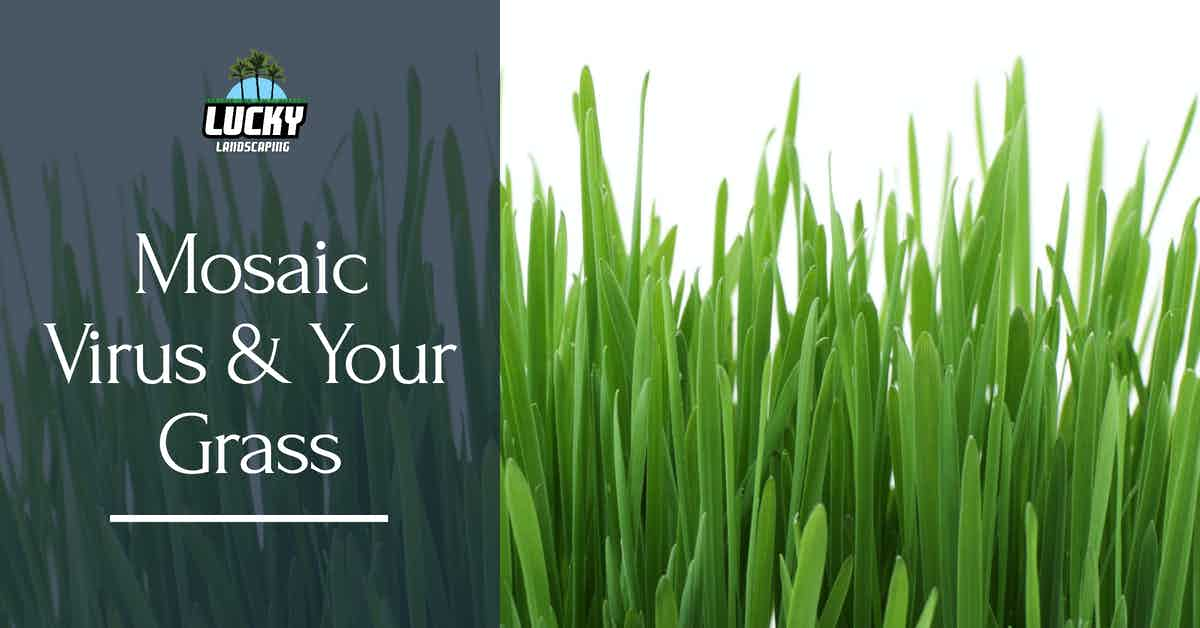The Effects of Mosaic Virus on St. Augustine Grass
Three years ago, the Plant Diagnostic Clinic at UF/TREC isolated samples of turfgrass that tested positive for Sugarcane Mosaic Virus.
The Mosaic virus affects the leaf of the St Augustine grass the most but can affect other turfgrass as well.
You can identify the early stages of the infection by the mosaic pattern that forms on the grass’s leaf. The leaf then turns brown and dies. The yellow and green designs on the grass are a clear indication of the infection. The broken yellow streaks that run between the veins of the blades of grass are clear evidence in an otherwise green blade.
The infection is cyclical, starting with the usual dieback of fall. Most lawns can show some recovery in the spring, but mostly, they will ultimately die back over three years.
Preventing the Spread
Cross-contamination occurs in several ways. The use of lawn equipment like mowers and string trimmers can spread the disease to healthy lawns. It would help if you cleaned all equipment adequately between areas to prevent cross-contamination.
Adopting adequate sanitation to prevent the disease from spreading further can help eradicate the infection rates.
Equipment needs to be cleaned, sprayed down, and disinfected.
You can use any of the following products to clean your equipment:
- Bleach: Mix household bleach with nine parts water. Ensure you dry the equipment properly afterward, as bleach can cause rust on the steel parts.
- Lysol, Physan 20, or quaternary ammonia products: These can kill off the virus caring bacteria.
- Pinesol: Mix this disinfectant with three parts water before use.
- Potassium Peroxymonosulfate and Sodium Chloride: mixed at a 2% solution can also work to disinfect the equipment.
Testing your lawn for contamination
If you are unsure if your lawn is contaminated with Mosaic Virus, you can do the following:
- Grab a cookie cutter or use a shovel to cut a reasonably large sample out of the lawn.
- Remove any excess soil from the grass.
- Do not rinse it or add any water to the sample.
- Take a photo of the area where you took the sample from and add the following for the records: The variety of St Augustinegrass, Age of the lawn, the street address. maintenance routine, products, fertilizers, or pesticides used.
Submitting this to the UF/IFPAS Plant Diagnostic Centre is crucial to track the virus’s spread.
Replacement of your lawn
Although St Augustine (Floratam) grass is the worst affected turfgrass, other floratam grass will get reinfected and also die if you replace like for like. We recommend you replace your infected grass with a different strain to avoid them dying. Resistant grass types include Palmetto and Bitterblue. Replacing your infected lawn with these variants should solve the problem.
Management of the affected lawn
There is, unfortunately, no known cure or treatment program for the affected lawn. The only option is to replace the affected grass with a resistant variety.
Ensure you continue acceptable sanitization practices once you have replaced the affected lawn. Adding pesticides does not help prevent the infection or spread of the disease.
You can consider replacing the affected area with hardscape alternatives or other plant materials as well.
The UF/IFAS Plant Diagnostic Centre is serious about tracking the spread and infection rates of the SCMV in Florida, so if you do suspect your lawn is affected, please submit a sample to your local UF/IFAS Extension office. Find your local office using this link: UF/IFAS Extention Office Locator.
If you want assistance with your HOA community in South Florida, touch base with the professionals to get it done, Lucky Landscaping is just a call away.
Our Crew
Only our trusted crews will be working on your property. All of our employees have background checks done, so you can rest assured that our crews are safe to be on your property. We hold our employees accountable and train them in customer service and best lawn care and landscaping practices, so you will only have responsible and conscientious workers taking care of your South Florida HOA Landscaping.
Do not hesitate to call Lucky Landscaping at 561-779-4127 and we will gladly make an appointment to discuss your Palm Beach County Landscaping needs and give you a quotation for the work.
